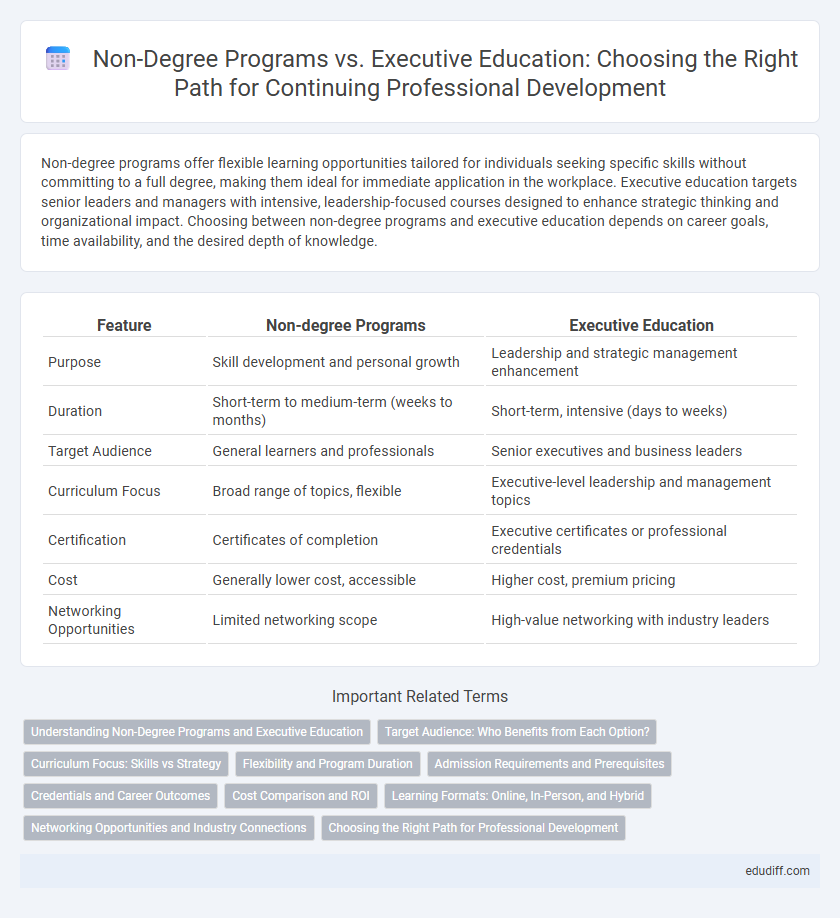Non-degree programs offer flexible learning opportunities tailored for individuals seeking specific skills without committing to a full degree, making them ideal for immediate application in the workplace. Executive education targets senior leaders and managers with intensive, leadership-focused courses designed to enhance strategic thinking and organizational impact. Choosing between non-degree programs and executive education depends on career goals, time availability, and the desired depth of knowledge.
Table of Comparison
| Feature | Non-degree Programs | Executive Education |
|---|---|---|
| Purpose | Skill development and personal growth | Leadership and strategic management enhancement |
| Duration | Short-term to medium-term (weeks to months) | Short-term, intensive (days to weeks) |
| Target Audience | General learners and professionals | Senior executives and business leaders |
| Curriculum Focus | Broad range of topics, flexible | Executive-level leadership and management topics |
| Certification | Certificates of completion | Executive certificates or professional credentials |
| Cost | Generally lower cost, accessible | Higher cost, premium pricing |
| Networking Opportunities | Limited networking scope | High-value networking with industry leaders |
Understanding Non-Degree Programs and Executive Education
Non-degree programs offer flexible, skill-focused learning opportunities designed for professionals seeking to enhance specific competencies without committing to a full academic degree. Executive education typically targets senior leaders and managers, providing intensive, strategic training to improve leadership, decision-making, and business acumen. Both formats prioritize career advancement but differ in structure, duration, and target audience, with non-degree programs often broader and executive education more specialized.
Target Audience: Who Benefits from Each Option?
Non-degree programs primarily cater to early-career professionals and individuals seeking specialized skills or career shifts without the commitment of a full degree, offering flexibility and targeted learning. Executive education targets mid- to senior-level managers and executives aiming to enhance leadership capabilities, strategic thinking, and industry insights through intensive, short-term courses. Organizations also benefit from executive programs by developing high-potential talent aligned with corporate goals and leadership pipelines.
Curriculum Focus: Skills vs Strategy
Non-degree programs primarily emphasize developing specific skills and technical competencies tailored to immediate job requirements, offering practical training in areas such as data analysis, coding, or digital marketing. Executive education focuses on strategic thinking, leadership development, and organizational management, equipping senior managers and executives with the tools to drive long-term business growth and navigate complex market challenges. Both educational paths address different career stages and learning objectives, with non-degree programs targeting hands-on expertise and executive education prioritizing high-level strategic acumen.
Flexibility and Program Duration
Non-degree programs offer greater flexibility with self-paced or short-term courses, ideal for professionals seeking quick skill upgrades without long commitments. Executive education typically involves intensive, shorter-term sessions spanning days to weeks, designed for executives balancing busy schedules. Both formats cater to diverse learning needs, but non-degree programs provide ongoing access, whereas executive education emphasizes immersion in a condensed timeframe.
Admission Requirements and Prerequisites
Non-degree programs typically have minimal admission requirements, often open to professionals and learners without strict prerequisites, allowing broader access to skill development. Executive education programs, however, usually require several years of managerial experience and sometimes employer endorsement to ensure participants have the context to maximize learning outcomes. Admission criteria for executive courses emphasize leadership potential and career progression, distinguishing them from the more flexible entry standards of non-degree offerings.
Credentials and Career Outcomes
Non-degree programs offer targeted skill development and credentials recognized for specific competencies, while executive education provides advanced leadership training often linked to prestigious institutions, enhancing professional credibility. Credentials from executive education programs can significantly boost career advancement opportunities and salary potential by signaling expertise and commitment to executive roles. Employers increasingly value both forms for continuous learning, though executive education tends to impact career trajectories more markedly due to its focus on strategic management skills.
Cost Comparison and ROI
Non-degree programs typically offer lower upfront costs compared to executive education, making them accessible for individuals seeking specific skills without long-term commitment. Executive education programs often demand higher tuition but provide greater ROI through leadership development and expanded professional networks, enhancing career advancement opportunities. Evaluating total expenses against potential salary increases and career growth is essential for making an informed investment decision.
Learning Formats: Online, In-Person, and Hybrid
Non-degree programs and executive education both offer flexible learning formats, including online, in-person, and hybrid options tailored to professional schedules. Online formats provide accessibility and self-paced learning, while in-person sessions foster networking and hands-on experiences. Hybrid models combine the convenience of digital courses with the engagement of face-to-face interactions, optimizing knowledge retention and skill application.
Networking Opportunities and Industry Connections
Non-degree programs often provide targeted networking opportunities within specific industries, enabling participants to connect with peers and professionals who share similar career goals. Executive education typically offers broader access to senior leaders and industry experts, fostering high-level partnerships and collaborations that can influence strategic decision-making. Both formats enhance industry connections, but executive education generally facilitates deeper engagement with influential executives and organizational networks.
Choosing the Right Path for Professional Development
Choosing the right path for professional development depends on career goals, time commitment, and desired skill specialization. Non-degree programs offer flexible, short-term learning opportunities targeting specific skills or industry knowledge, ideal for those seeking quick upskilling. Executive education programs provide in-depth, leadership-focused training designed for seasoned professionals aiming to advance into higher management roles.
Non-degree Programs vs Executive Education Infographic

 edudiff.com
edudiff.com